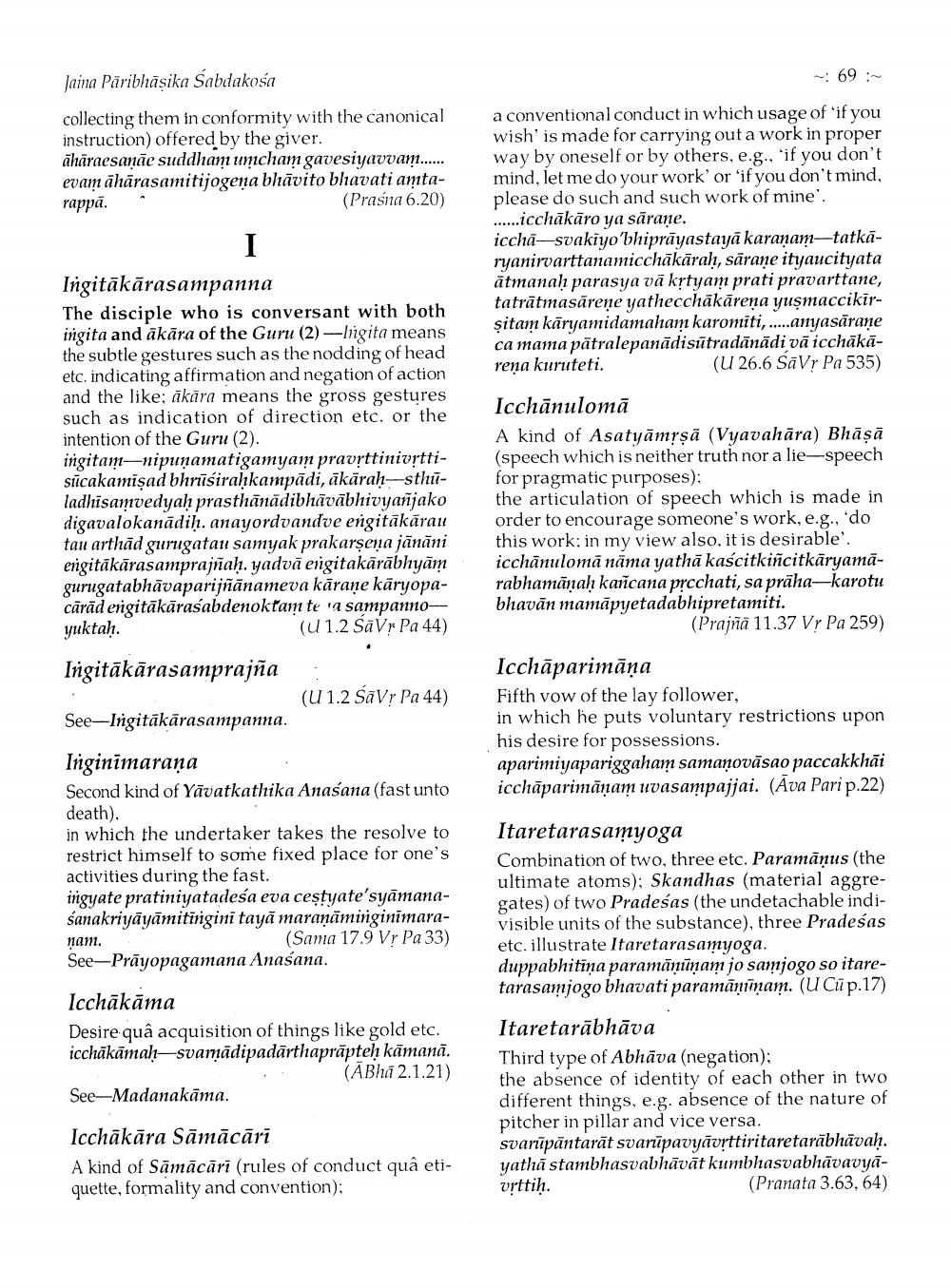________________
- 69
Jaina Pāribhāșika Sabdakosa collecting them in conformity with the canonical instruction) offered by the giver. āhāraesaņāe suddham umcham gavesiyavvam...... evam āhārasamitijogena bhāvito bhavati amtarappā.
(Prasna 6.20)
a conventional conduct in which usage of 'if you wish' is made for carrying out a work in proper way by oneself or by others, e.g., if you don't mind, let me do your work' or 'if you don't mind, please do such and such work of mine'. ......icchākāro ya sārane. iccha-svakiyo'bhiprāyastayā karanam-tatkāryanirvarttanamicchākārah, sārane ityaucityata ātmanal parasya vā krtyam prati pravarttane, tatrātmasārene yathecchākāreņa yuşmaccikirşitam kāryamidamaham karomiti,.....anyasārane ca mama pätralepanādisutradānādi vā icchākāreņa kuruteti.
(U 26.6 SāVr Pa 535)
Ingitākārasampanna The disciple who is conversant with both ingita and äkāra of the Guru (2) - Irgita means the subtle gestures such as the nodding of head etc. indicating affirmation and negation of action and the like; ākāra means the gross gestures such as indication of direction etc. or the intention of the Guru (2). ingitam-nipunamatigamyam pravrttinivrttisūcakamisad bhrūsiraḥkampādi, ākārah--sthuladhisamvedyah prasthānādibhāvābhivyañjako digavalokanādih. anayordvandve engitäkārau tau arthād gurugatau samyak prakarsena jänāni engitākārasamprajñaḥ. yadvă erigitakārābhyām gurugatabhāvaparijñānameva kärane kāryopacārād erigitākārasabdenoktam te 'a sampannoyuktaḥ.
(u 1.2 Savr Pa 44)
Icchānulomā A kind of Asatyāmrsā (Vyavahāra) Bhāṣā (speech which is neither truth nor a lie-speech for pragmatic purposes); the articulation of speech which is made in order to encourage someone's work, e.g., do this work: in my view also, it is desirable'. icchānulomā nāma yathā kaścitkiñcitkāryamarabhamānah kancana prcchati, sa prāha-karotu bhavan mamāpyetadabhipretamiti.
(Prajna 11.37 Vr Pa 259)
Ingitākārasamprajña
(U 1.2 ŚãVr Pa 44)
See-Ingitākārasampanna.
Icchāparimāņa Fifth vow of the lay follower, in which he puts voluntary restrictions upon his desire for possessions. aparimiyapariggaham samaņovāsao paccakkhāi icchāparimāņam uvasampajjai. (Ava Pari p.22)
Inginimarana Second kind of Yāvatkathika Anasana (fast unto death), in which the undertaker takes the resolve to restrict himself to some fixed place for one's activities during the fast. ingyate pratiniyatadeśa eva cestyate'syāmanasanakriyāyāmitingini tayā maraņāminginimaranam.
(Sama 17.9 Vr Pa 33) See-Prāyopagamana Anaśana.
Itaretarasamyoga Combination of two, three etc. Paramāņus (the ultimate atoms); Skandhas (material aggregates) of two Pradeśas (the undetachable indivisible units of the substance), three Pradeśas etc. illustrate Itaretarasamyoga. duppabhitina paramānūnam jo samjogo so itaretarasamjogo bhavati paramānīņam. (U Cüp.17)
Icchākāma Desire quâ acquisition of things like gold etc. icchākāmah-svarādipadārthaprāpteh kämanā.
(ABha 2.1.21) See-Madanakāma.
Itaretarābhāva Third type of Abhāva (negation); the absence of identity of each other in two different things, e.g. absence of the nature of pitcher in pillar and vice versa. svarūpāntarāt svarūpavyāvrttiritaretarābhāvah. yathā stambhasvabhāvāt kumbhasvabhāvavyāvrttiḥ.
(Pranata 3.63, 64)
Icchākāra Sāmācāri A kind of Sāmācāri (rules of conduct quâ etiquette, formality and convention);




